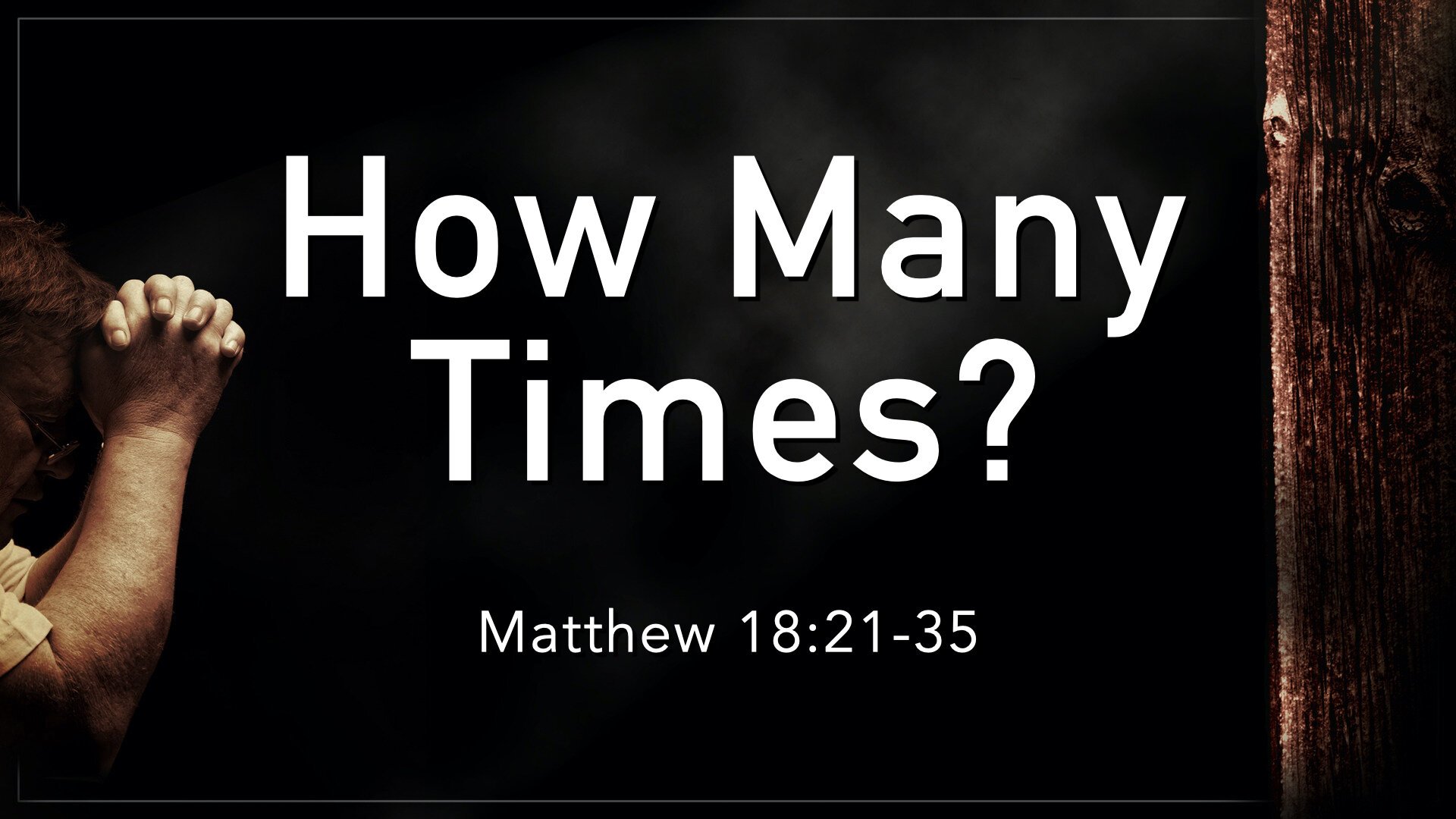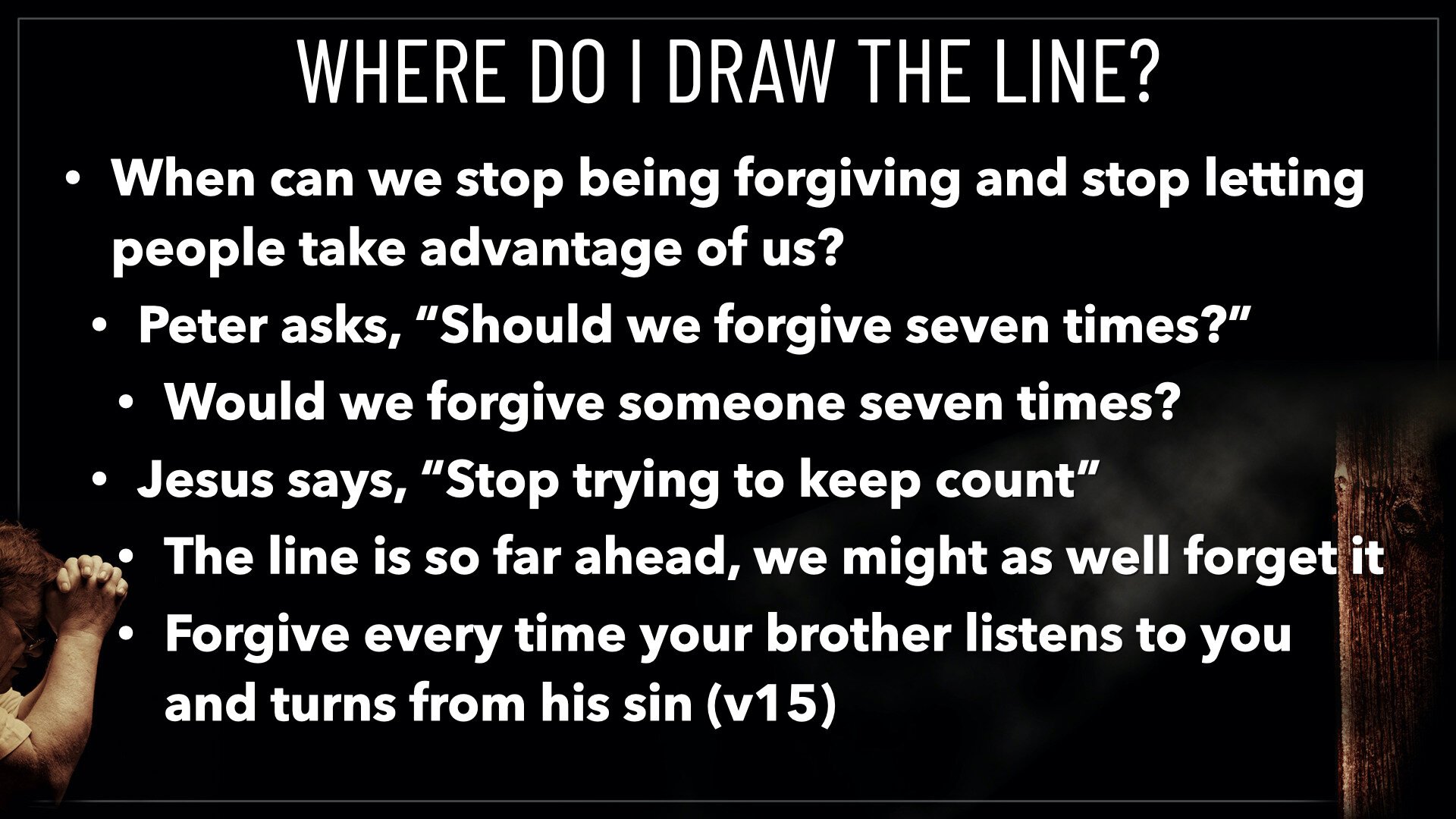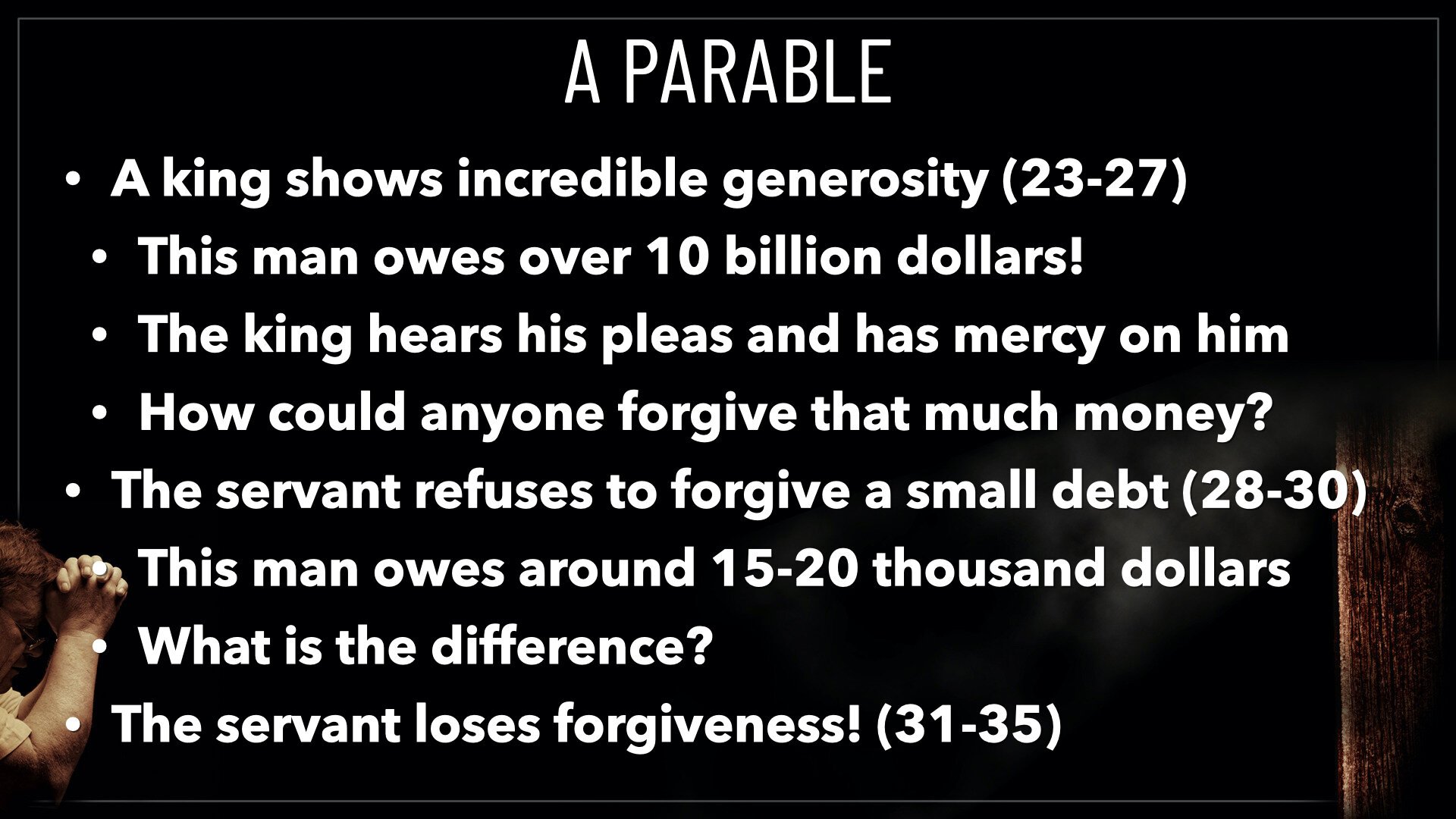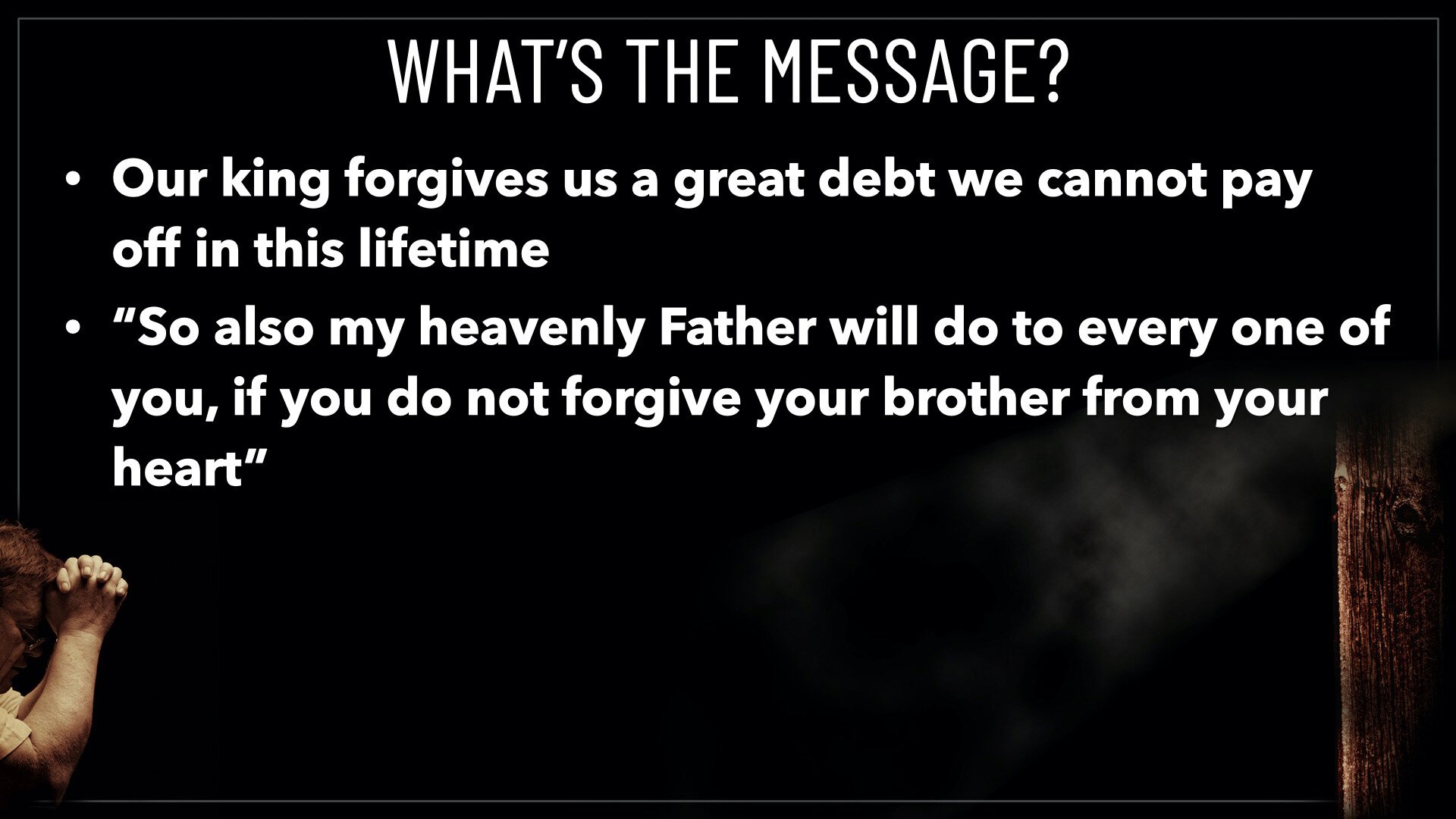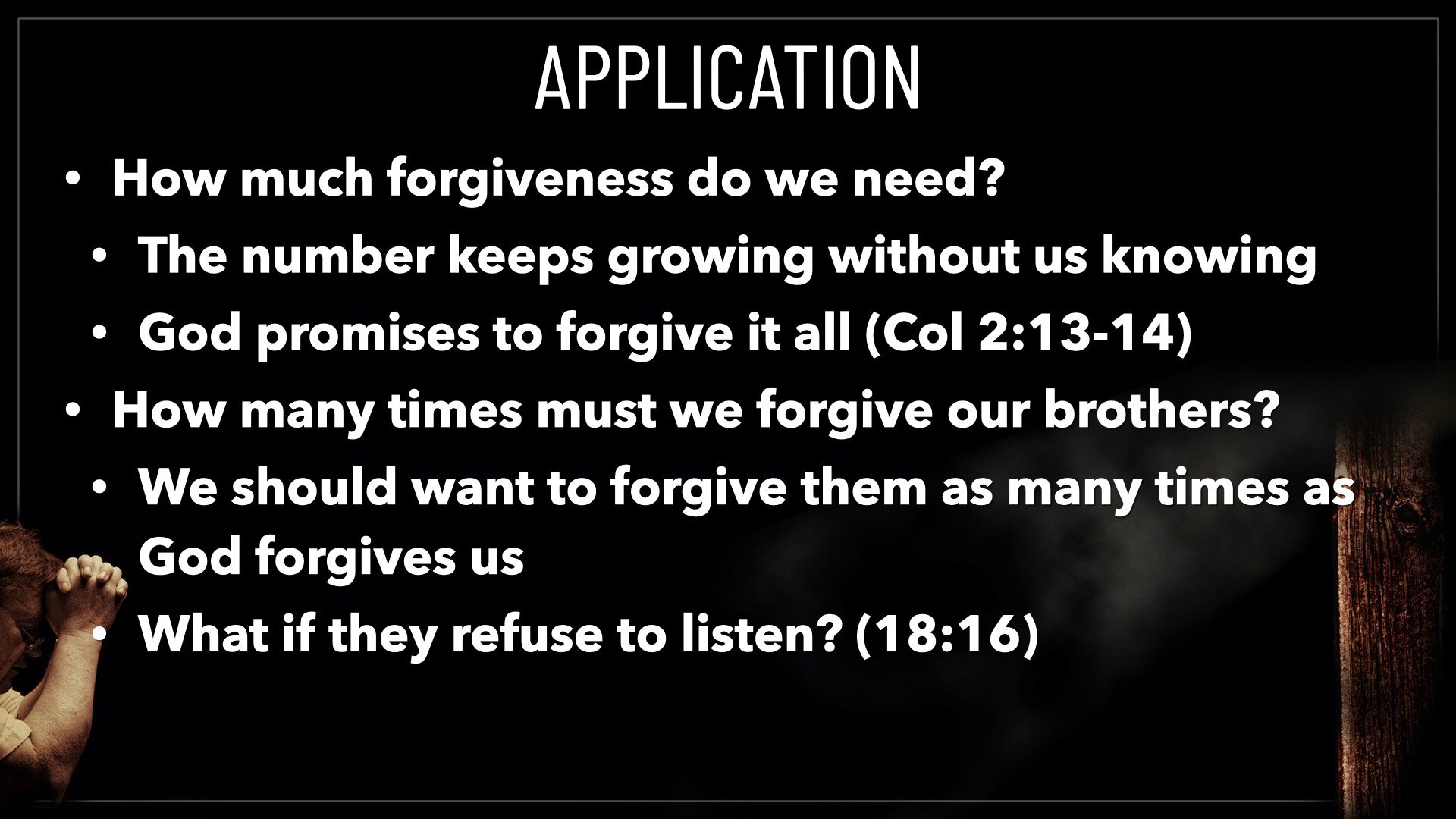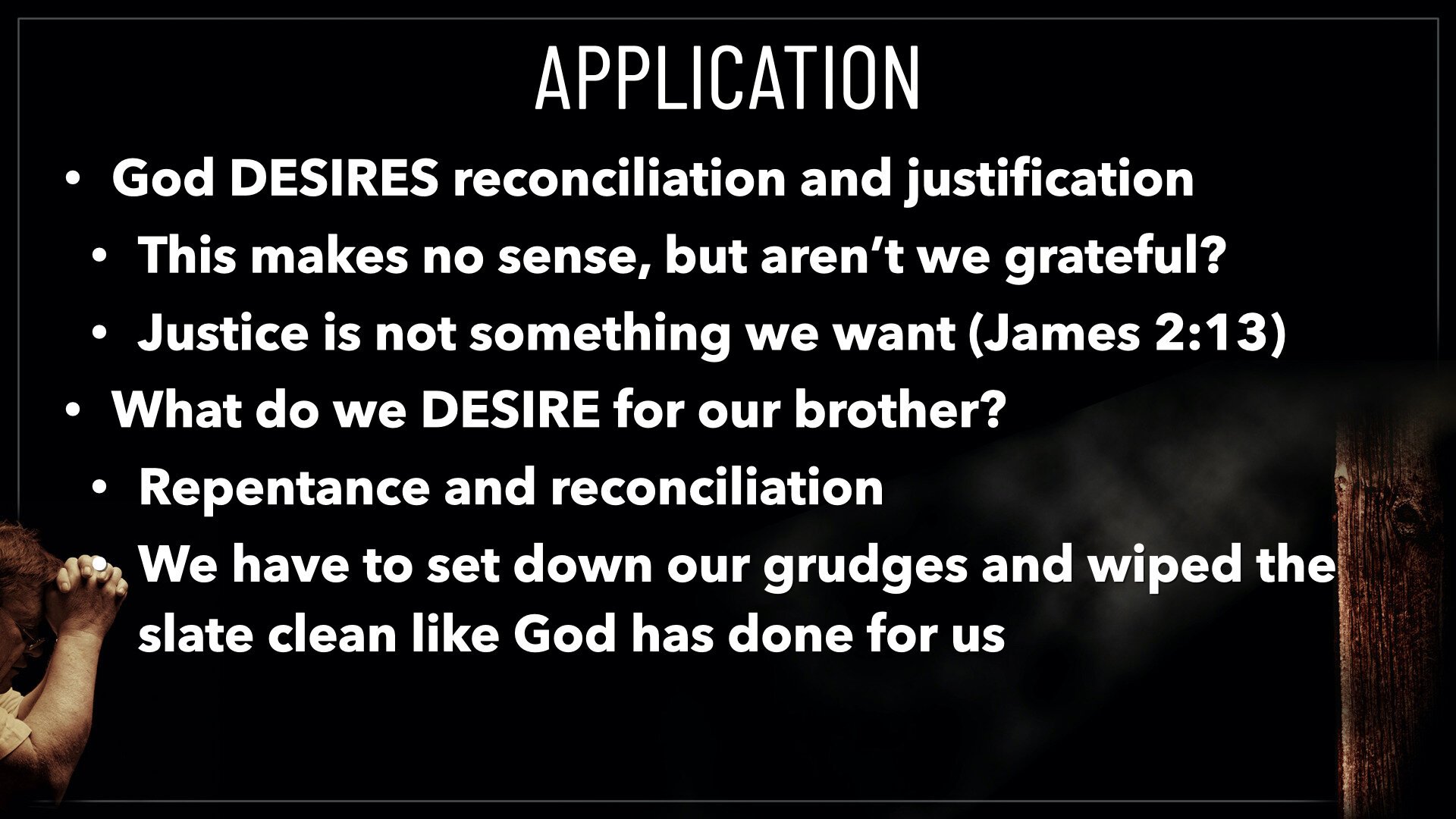How Many Times (Matthew 18:21-35)
How hard is it for us to forgive someone who wrongs us? What an emotional toll it takes on us to forgive and act like everything is okay. How can we do better at that? Showing mercy toward others means that we are giving forgiveness to someone who doesn't deserve it. How can we be merciful when we really don't want to? Peter wants to know the answer to this same question in Matthew 18. In verse 15, Jesus tells everyone that, "If your brother sins against you, go and tell him his fault, between you and him alone. If he listens to you, you have gained your brother." Peter comes up to him after this in verse 21 and wants to quantify this command. It seems like Jesus is assuming forgiveness.
Matthew 18:21 (ESV) --- 21 Then Peter came up and said to him, "Lord, how often will my brother sin against me, and I forgive him? As many as seven times?"
Where Do I Draw The Line?
Here we have someone who is perpetually sinning against us. When can we draw the line and say, "Okay, this is it?" Or when can we say, "One more time and you are done, no more forgiveness after that?" We all want to know the answer to this question. When can we stop being forgiving and stop being taken advantage of? There has to be some limit to forgiveness! Seven times might sound like a lot to us. How does the saying go? "Fool me once, shame on you. Fool me twice, shame on me." Our limit if we live by that rule is two times. Peter says seven times! Imagine someone gossiping about you and getting caught seven times. Imagine any sin seven times. It seems like a major ordeal to forgive someone seven times. How emotionally draining that would be! What does Jesus say?
Matthew 18:22 (ESV) --- 22 Jesus said to him, “I do not say to you seven times, but seventy-seven times.
Where is Jesus' line in the sand? Seventy-seven. Wow! That's a lot! For all the emotional toll seven times would take, imagine forgiving seventy-seven times for the same offense. Jesus says that this is what he wants us to do. The line in the sand is so far away that we might as well forget that it's there. The answer is always to forgive them for sinning against you when they listen to you and ask for forgiveness. Why would Jesus say that? It seems like a far fetched idea and something that many of us would struggle to perform. Why should we be that merciful, and how could we possibly do that?
A Parable
Jesus answers those two questions by giving us a parable. Parables are great for helping us understand difficult topics and helping us find the motivation to do the will of God. Let's read the first part of the parable.
Matthew 18:23--27 (ESV) --- 23 “Therefore the kingdom of heaven may be compared to a king who wished to settle accounts with his servants. 24 When he began to settle, one was brought to him who owed him ten thousand talents. 25 And since he could not pay, his master ordered him to be sold, with his wife and children and all that he had, and payment to be made. 26 So the servant fell on his knees, imploring him, ‘Have patience with me, and I will pay you everything.’ 27 And out of pity for him, the master of that servant released him and forgave him the debt.
The parable starts with a king who wishes to settle accounts, and he goes to one guy in verse 24 who owes 10,000 talents. That may not seem like a lot to us. We may think 10,000 dollars, but a single talent is 20 years of wages at that time. A single talent is 20 years wages, and he owes 10,000 of them. If you multiply that out, considering an average yearly salary to be $50,000 today, that's like 10 billion dollars. I know some people with credit problems, but 10 billion is not a number that I'm familiar with. I don't even know what that looks like. It's more money than any of us will ever see in our lifetime. Verse 25 says that he couldn't pay. Well, of course not! The king wants this account settled, so he expects to get that money back, and the servant falls on his knees and begs for time to repay the debt.
Verse 27 says that the king had pity on the man, and the master forgave him the debt. How could he do that? That must have hurt the king to do that. He must have really wanted those accounts settled. Can you imagine being the servant who is forgiven such a crazy debt? He is one lucky dude! I don't think that much debt forgiveness has ever been recorded. Can you imagine being that one in a trillion person who is forgiven that much? I would be wondering who in their right mind would forgive so much. He's got to be crazy. But I would never say that to the king. I would be so grateful for the pity that he felt for me. This would be a life-changing event for the servant who is forgiven so much by this generous king. Look at what the servant goes out and does after this happens to him.
Matthew 18:28--30 (ESV) --- 28 But when that same servant went out, he found one of his fellow servants who owed him a hundred denarii, and seizing him, he began to choke him, saying, ‘Pay what you owe.’ 29 So his fellow servant fell down and pleaded with him, ‘Have patience with me, and I will pay you.’ 30 He refused and went and put him in prison until he should pay the debt.
This servant, who the king just forgave so much, goes out and finds a man who owes him 100 denarii. One denarius is a day's wage, so, assuming our previous income, this would be about 15-20 thousand dollars. This is not a small debt. If someone owes us 15-20 thousand dollars, we aren't going to take that lightly, but it is manageable. It is a debt we could pay off over time. Many of you may have car payments that are close to that. In about five years, you might be able to pay that off with no problem. What is the pressing need for this guy? The king just forgave him a considerable debt. Why does he need to settle accounts? Notice that the servant who was begging for patience hears the same thing from his fellow servant. It says he "fell down" and "pleaded with him, 'Have patience with me, and I will pay you.'" This is a payable debt, and he is just asking for more time. Notice that he is not asking for the debt to be forgiven. He's not trying to take advantage of the servant's newly found debt relief. He just wants more time to pay this off.
The response is totally different. Verse 30 says, "He refused and went and put him in prison until he should pay the debt." He put the man in prison for not having the money to pay him at that moment. What a jerk! Let's read how this parable ends.
Matthew 18:31--35 (ESV) --- 31 When his fellow servants saw what had taken place, they were greatly distressed, and they went and reported to their master all that had taken place. 32 Then his master summoned him and said to him, ‘You wicked servant! I forgave you all that debt because you pleaded with me. 33 And should not you have had mercy on your fellow servant, as I had mercy on you?’ 34 And in anger his master delivered him to the jailers, until he should pay all his debt. 35 So also my heavenly Father will do to every one of you, if you do not forgive your brother from your heart.”
The king finds out and is not too happy to hear how this blessed servant responded to the forgiveness he had received. He says, "You wicked servant!" and commands him to be delivered to the jailers. This is a huge turn around in the story all because of how this servant responds. What is the message for Peter and us in this parable? The main point is verse 35: Those who refuse to forgive from the heart will receive the punishment they deserve. As we struggle to find the will to forgive someone who has sinned against us asking, "How can we be merciful when we really don't want to?" Jesus answers with this parable.
What's the message?
There are two very valuable lessons for us in this text. First, we see that God has been extremely merciful to us by offering to forgive our sins. God sees every sin we have ever committed, but he is willing to forgive them all if we turn and plead with him for mercy. Second, we see that all who refuse to forgive will receive the punishment they deserve. This is a scary thought that should move us to forgiveness.
Application
1. Our king forgives us a great debt. Debts of others may be big enough to hurt us, like $20,000 would hurt us. But when a person comes to us pleading for forgiveness after taking one dollar from us 20,000 times, God wants us to look at him with pity. Can you imagine being this forgiving? Think for a moment about our sins against God. How many times have we done something we knew we shouldn't do? That number is probably beyond counting. How many times have we failed to do something we knew we should do. Does sinning so many times mean you are insincere as you beg for God to forgive you? Maybe that sin is behind you now. You love God enough to stop doing that sin, and you have, by the grace of God, overcome that sin. What if God gave up on you on the 7th time? Aren't you happy that he didn't? Aren't we all? If we were to have some kind of sin counter attached to our bodies, can you imagine how high that number would be right now? God says that he is willing to forgive all of it, not so that we can go on sinning, but so that we can experience that blessing and learn to be like him.
2. All who refuse to forgive, will receive the punishment they deserve. Verse 30 shows that we cannot refuse to give mercy to those who ask for it. Obviously, if we take the sin of someone to them, as verse 15 says we are supposed to do, and they refuse to listen to us, there is no mercy. God doesn't give mercy to the one who does not listen. This is not unilateral forgiveness. Love is supposed to be given to our enemies, but forgiveness is not expected if they refuse to listen. But if someone comes to us asking for forgiveness, we must not refuse. If we do, God will refuse us forgiveness. If we understand how indebted we are, we should want to forgive others. The desire to forgive should come pouring out of our hearts because we know God didn't have to forgive us, but he wanted to. It's not that we put on a show or act like everything is okay between us. God's not acting! He wants to forgive us with his heart.
His forgiveness makes no logical sense to us. He doesn't look at us and think, "Wow, those are amazing people down there. I wonder what it would be like to bless them and watch them sin against me over and over again. I wonder what it would be like to forgive them 10 billion times. Sounds fun!" God wants us to be forgiven because he pities us, and he is a merciful and loving God. That's who he is, and that's who he wants us to be. But if we refuse, "Justice is without mercy to the one who shows no mercy (James 2:13)."
God Wants Reconciliation and So Do We!
I have heard people excuse this idea of forgiving people and being merciful to justify the harsh judgments they have made and are continuing to make. I have seen people avoid forgiveness like it would hurt them to do it. They aren't willing to even bring the sin of the other person to them. Is that really what we want to do? It's ironic how that selfish attitude will only bring us more pain. Even if someone has gossiped about us and torn down our reputation beyond repair, refusing forgiveness won't fix anything or make anything better. I don't care what the sin is against us. We won't wake up in the morning cherishing our broken relationship. Broken relationships hurt us badly. That's not what we really want. That's not what God wants either. He wants people looking for opportunities to reconcile their relationship with each other and look for opportunities to bring others to reconciliation with God. What if we set down our harsh judgments and wiped the slate clean for those who have asked for it? What if we saw the love of God for us and became people who show mercy to those who don't deserve it? What kind of message would that send to the world around us?
Conclusion
God is training us all to be like him. Just as he is merciful, so we also must be merciful. God sees us lying there in the dirt, unable to do anything for ourselves, and he wants us to be more, so he made a way for us to be forgiven. How? Think about the cost of that forgiveness. Think about the debt that men stored up for themselves as they spat on God. Think about the punches and the kicks. Think about the scourging and the nails that they drove into his hands and his feet. Don't forget about the agony of hanging by those nails and having to lift himself for every breath. The men responsible for that would have an opportunity to be forgiven. The truth is that we all play some part in that responsibility. It is because we couldn't pay for our sins that Jesus did that. What is it that we can't forgive again? Have we any idea how much debt we owe God? Yet, he is willing to forgive us even right now for being unforgiving toward others. If he was willing to give his son for his enemies, God can bring us to him and forgive us now that we are turning to Him and desiring to be his children.

